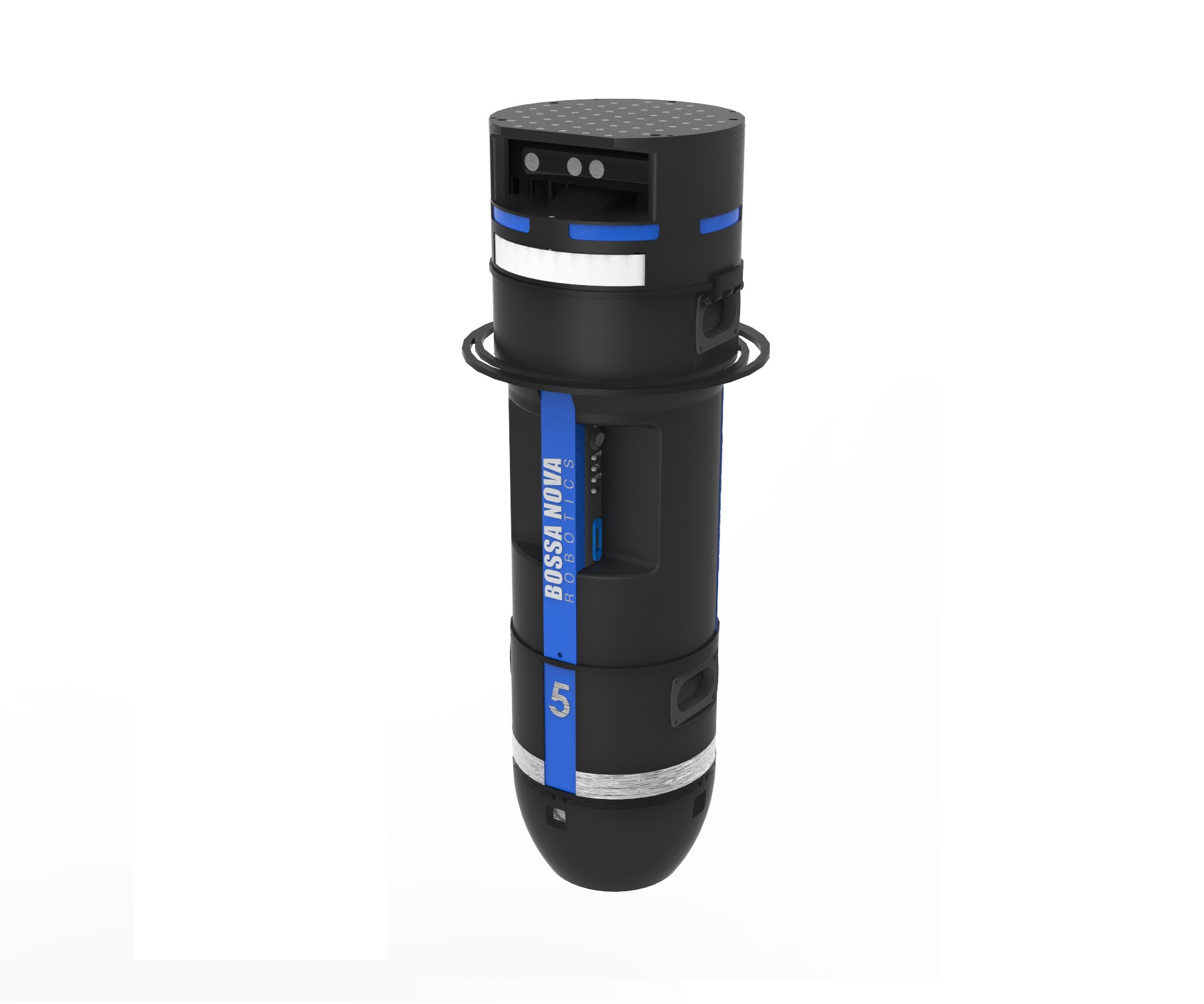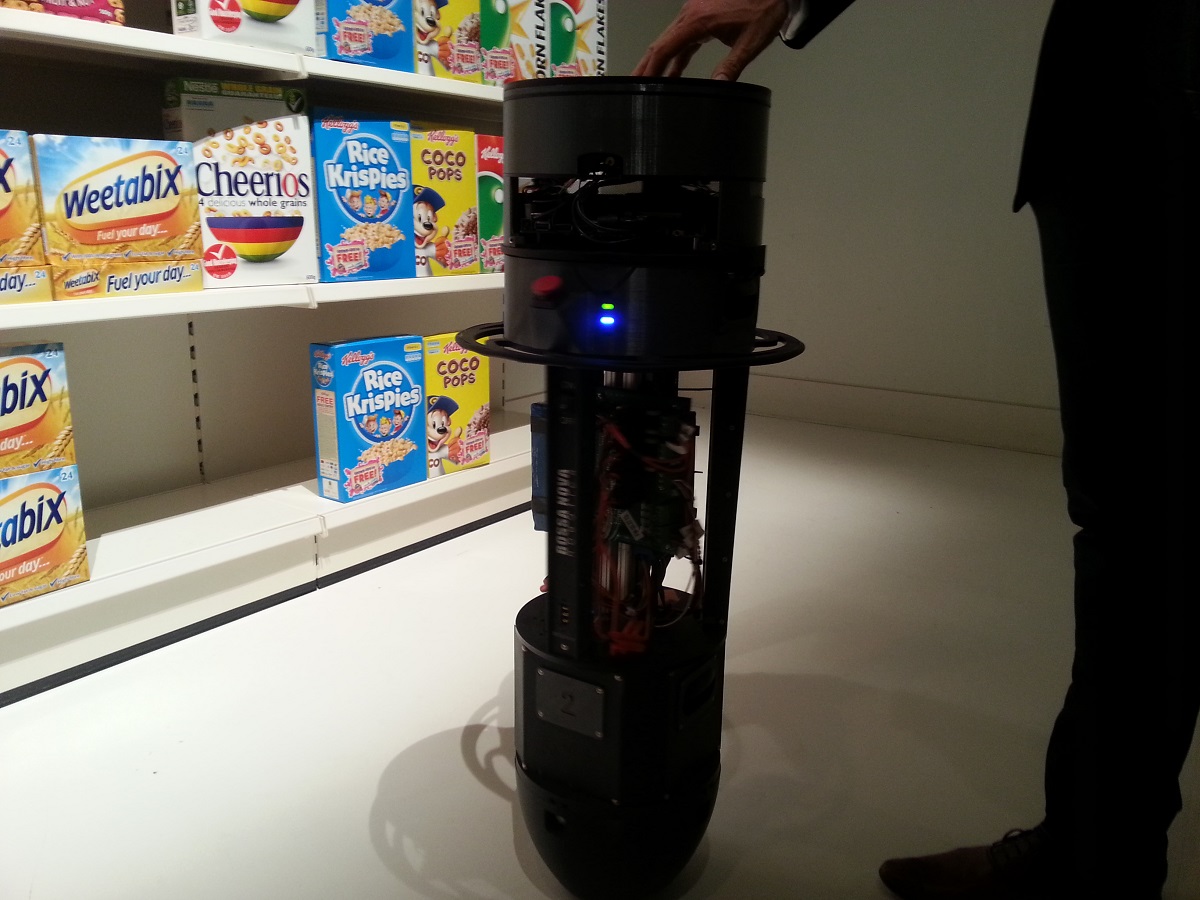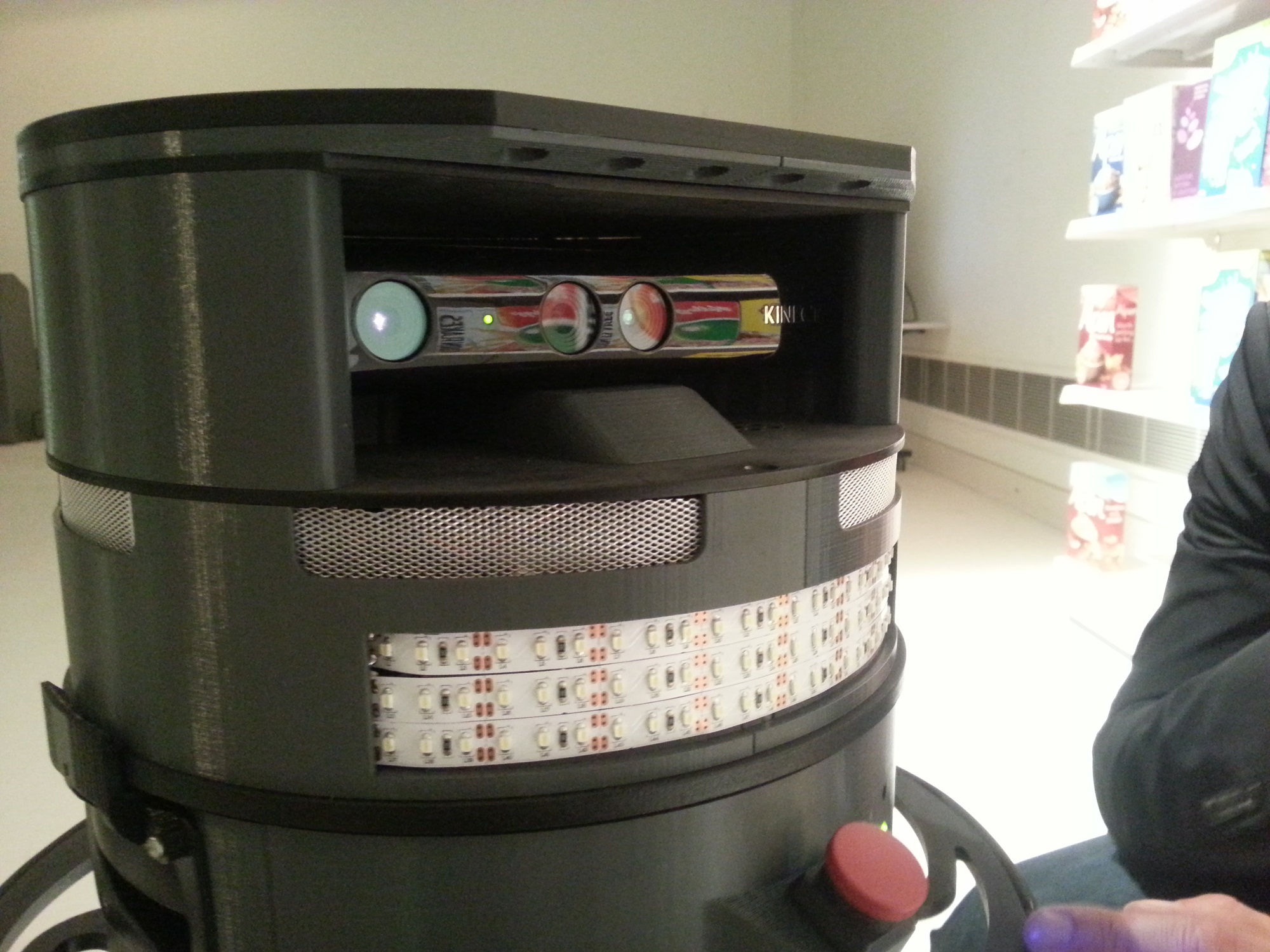Intel facilitates rise of the machines
Chipmaker provides brains behind the Mobi retail unit.

Intel showcased a range of technology at its Future of Retail event in central London today.
Products on display ranged from automated Costa Coffee machines to 3D printers and holographic displays, but the most intriguing prototype on show was the Mobi - an automated robot designed specifically for supermarkets.
Powered by Intel's next gen Core architecture, the five foot prototype is developed by Bossa Nova Robotics.
The robot utilises ballbot locomotive technology, which was developed by the Robotics Institute in Pittsburgh. This allows virtually a 360 degree range of motion and tricks the eye into thinking the robot is floating along as it has just a single 2cm2 point of contact with the floor.

Mobi prototype without casing
The Mobi is cylindrical in shape, and due to the way it moves the design is referred to as the reverse pendulum. There are two advantages of building units in this way, explained Martin Hitch, CEO of Bossa Nova, during a demonstration.
"If you think about the complexity of an aisle [there are] shopping carts, people, packages on the floor. If the Mobi bumps into anything it will bounce out of the way, which makes it inherently safe. Secondly, the inverse pendulum design means we can make the Mobi tall and remain narrow," he said.
Get the ITPro daily newsletter
Sign up today and you will receive a free copy of our Future Focus 2025 report - the leading guidance on AI, cybersecurity and other IT challenges as per 700+ senior executives
"In every other robotic platform, the taller we go, the broader you need to be for stability, which means you can't move around shopping carts and packages. If we need to have a 6 foot tall robot, we can do this but the 25cm diameter remains."
The layout of an entire supermarket or any retail store - known as a planogram - can be uploaded onto the Mobi allowing it to follow a designated path. Too "see" where it is going, the Mobi utilises HD cameras and 3D sensors. Engineers incoporated Microsoft's Kinect motion sensing kit into the robot, and plan to upgrade to the latest version of Kinect when it ships with the Xbox One later this year.

Mobi with Kinect sensors
The primary purpose of the Mobi is to alert staff to low stock or out of stock items and alert them about misplaced items on shelves.
At present the Mobi is able to spot empty spaces on shelves, but it won't necessarily be able to detect how many items of a specific product are left. Future use of RFID tags would enable more accurate stock takes, but currently cost is a barrier. Hitch suggested that when the cost of RFID's is down to 2/3 cents per tag, more accurate stock taking can be deployed.
Steve Brown, a chief evangelist at Intel, claimed that in its current form, the Mobi will still reduce the workload of shop floor workers by up to 40 per cent.
"[The Mobi] allows human beings focus their time on stocking shelves, filling gaps and also to provide customer service," he said.
"It's going to get better and better as you put more processing power in the Mobi [and] will be able to process [1TB of store] data on-board without having to send it to the cloud."
Not only will the data gathered potentially help to increase sales, but retailers will be able to analyse customer shopping patterns in-store, and subsequently adjust the layout of aisles if necessary to provide a better experience.
The Mobi is not just going to be relegated to simple donkey work either. Hitch told IT Pro that he was hopeful the Mobi could be set up to interact with shoppers by acting as an interactive shopping assistant.
Once RFID has been put to widespread use, Mobi is also expected to be rolled out in clothing stores, he added.
Like any new technology, Mobi isn't going to be cheap.
"The cost of the prototype is around the price of a small car. However, the cost of deployment is likely to be the same it would be to have an employee. It's about 18 months away from deployment so we expect to roll it out at the end of 2014."
The Mobi is likely to be launched in the US first, but Mitch confirmed that UK supermarkets have taken receipt of trial units so we could see Mobi motoring up the aisles in stores in 2015 and beyond.
-
 Should AI PCs be part of your next hardware refresh?
Should AI PCs be part of your next hardware refresh?AI PCs are fast becoming a business staple and a surefire way to future-proof your business
By Bobby Hellard Published
-
 Westcon-Comstor and Vectra AI launch brace of new channel initiatives
Westcon-Comstor and Vectra AI launch brace of new channel initiativesNews Westcon-Comstor and Vectra AI have announced the launch of two new channel growth initiatives focused on the managed security service provider (MSSP) space and AWS Marketplace.
By Daniel Todd Published
-
 Gaining timely insights with AI inferencing at the edge
Gaining timely insights with AI inferencing at the edgeWhitepaper Business differentiation in an AI-everywhere era
By ITPro Published
-
 Scaling AI from pilot to production: Maximize AI impact with HPE & Intel
Scaling AI from pilot to production: Maximize AI impact with HPE & IntelWhitepaper Transform AI proof-of-concepts into full-scale implementations
By ITPro Published
-
 Fuelling growth through transactions
Fuelling growth through transactionswhitepaper Prepare for the future of payments with flexible solutions
By ITPro Published
-
 Monetization strategies for digital content creators
Monetization strategies for digital content creatorswhitepaper An overview of the economies of forex markets in Latin America and what payment providers need to know to enter the region
By ITPro Published
-
 Retail forex development in Latin America
Retail forex development in Latin Americawhitepaper An overview of the economies of forex markets in Latin America and what payment providers need to know to enter the region
By ITPro Published
-
 Delivering an AI-powered content supply chain for retail and CPG
Delivering an AI-powered content supply chain for retail and CPGWhitepaper Solve application modernization challenges with generative AI
By ITPro Published
-
 UK supercomputer boom as HPE and Dell receive funding for new AI cluster
UK supercomputer boom as HPE and Dell receive funding for new AI clusterNews The UK’s AI computing capabilities will increase by an order of magnitude in 2024
By Rory Bathgate Published
-
 The state of restaurants in 2023
The state of restaurants in 2023Whitepaper How restaurants are adapting to an increasingly unstable economy, and the top trends on the horizon for 2023
By ITPro Published